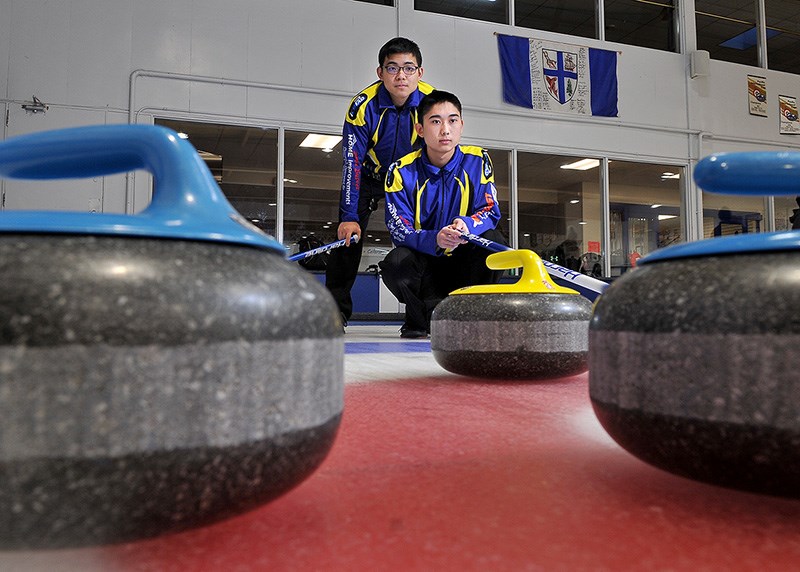For the defending provincial boys’ U18 curling champions, the more things stay the same, the more they change.
The components of the team that’s based out of the Royal City Curling Club in New Westminster are the same, but how they’re used is different.
Coquitlam’s Hayato Sato has slid into the leadership role while former skip Dawson Ballard is now the second. Port Coquitlam’s Joshua Miki, has moved up to third and Burnaby’s Troy Chong remains as the lead. The squad is still coached by Miki’s father, Bryan.
Sato said coming off an otherwise successful season that somewhat fizzled when the team finished ninth at the Canadian U18 championships in Saint Andrews, N.B., last April, the members wanted to “try something new” for this season.
The revised mix seems to be paying off.
Team Sato recently finished third at the BC junior curling championships in Vernon, against older, more experienced curlers. In fact, they narrowly missed qualifying for the championship when they lost the semifinal to Erik Colwell’s Vernon rink in an extra end, 11-10, after they had tied the game with a point of their own in the tenth end.
The squad will soon begin regional playdowns leading to this year’s U18 provincial championships in Juan de Fuca, and at the end of February they’ll be representing British Columbia at the Canada Winter Games in Red Deer, Ab.
Sato, said now that everyone on the team has settled into their new roles, they’re hitting their stride right when it matters most.
But, he added, changing the mix wasn’t just about striving for results this season.
“We’re trying to become players who can do a bit of everything for our transition into men’s curling.”
For Sato and Ballard, who are both 18 years-old, that elevation to junior men is imminent, while Miki and Chong are both 17.
Sato said his leadership style relies on communication while his playing style is conservative, awaiting opportunities to pounce on opponents’ mistakes.
Miki said those qualities have resonated with the team.
“We have a check-your-ego-at-the-door approach,” he said. “We’re all on board.”
Sato said talking out shots and strategies amongst the team as a game unfolds allows everyone to concentrate on curling’s fine details, like how the rock is rotating on turns or whether there’s any inconsistencies in the ice that can affect the trajectory of a shot, which can make or break a result.
“We all just do it as a group,” he said.
Miki said that’s helped keep the team together as a unit.
And it’s helped them weather disappointments like last spring’s nationals or their heartbreaking loss in Vernon.
In fact, Sato said, those setbacks will help them be better prepared this year.
“Knowing what it’s like to be at a national competition will really help us play the best,” he said.
Curlers hoping for hub
The defending provincial boys’ U18 curling champions used to share their home base between the Coquitlam and Royal City curling clubs.
But with the closure last spring of the Coquitlam facility at the Poirier Sports and Leisure Complex, skip Hayato Sato and second, Joshua Miki, may be the last generation of top young curlers from the Tri-Cities who were able to hone their game on home ice.
Miki, whose dad, Bryan, is also the team’s coach with a world championship pedigree, said the loss of the ice sheets at Poirier, along with the scarcity of practice times at the Port Moody Curling Club, which absorbed many of Coquitlam’s members, has made it a bit of a scramble.
“It’s unfortunate that it’s gone,” he said, adding the team now travels as far afield as Cloverdale to curl together. “It’s hard to find ice time a few times a week.”
Sato said the strong junior program that was in place in Coquitlam pushed all the young curlers with ambitions.
“There was lots of great curlers there,” he said, adding now that many have scattered, bringing together new talent is more difficult.
But the two young curlers hope that situation won’t last. They’re rooting for efforts to establish a purpose-built curling centre of excellence somewhere in the Tri-Cities.
Curl BC and the Coquitlam Curling Association have put forth a proposal for an eight-sheet, 37,500-sq. ft. facility that would cost approximately $24 million to councils in all three of the Tri-Cities, but a location has yet to be determined.
Miki said such a facility would become a hub for top young curlers, learning from and pushing each other to excel.
Sato said the best way for curlers to improve is to watch and heed the example of better curlers.
“It would really give us an idea of the quality of the top curlers,” he said.



